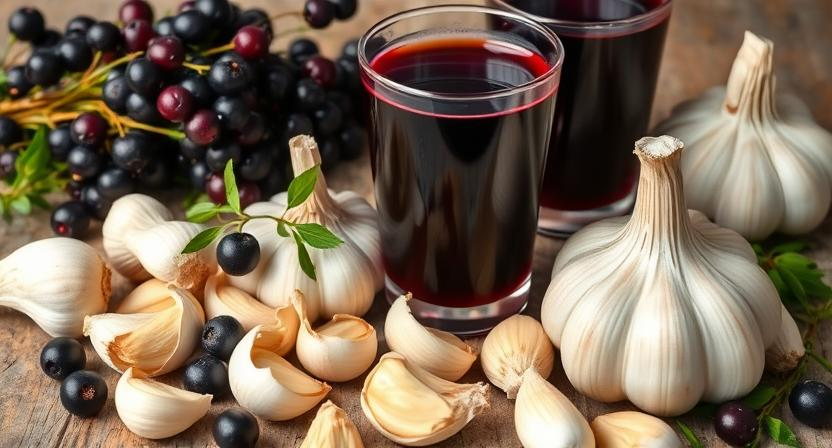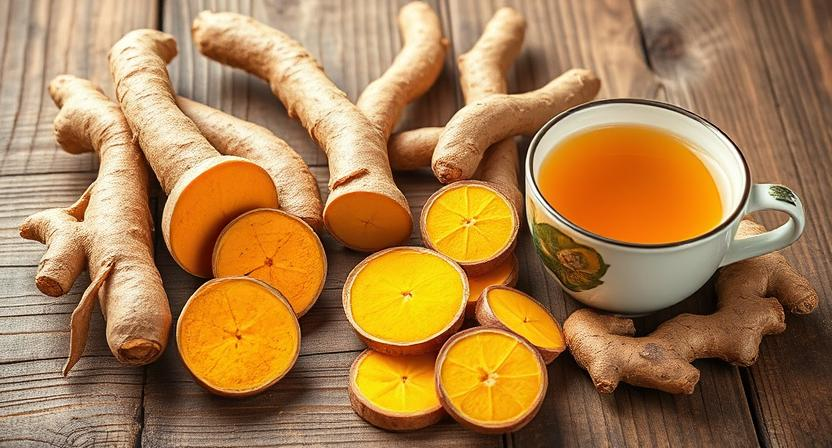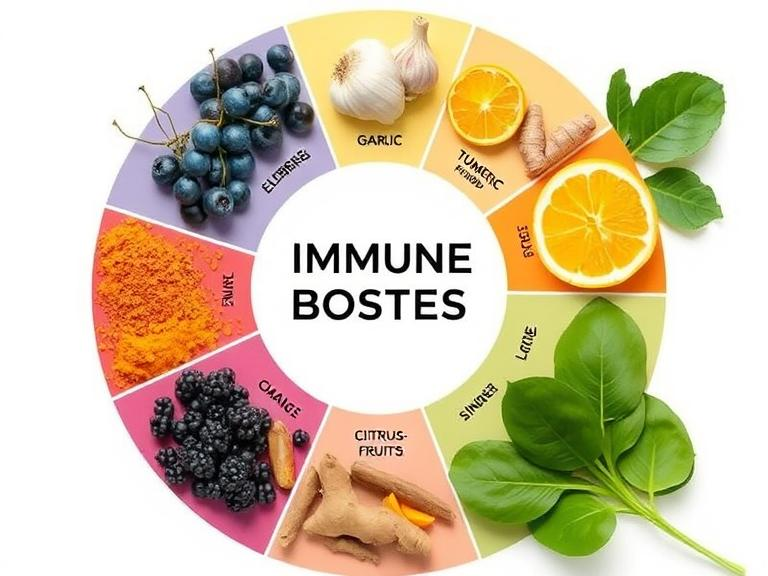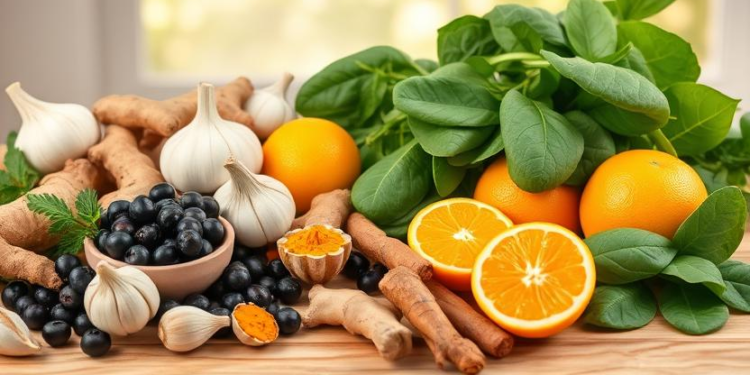Table of Contents
1. Understanding Your Immune System
Your immune system is an intricate network of cells, tissues, and organs that work in concert to defend your body against infections and diseases. At its core, the immune system comprises two primary lines of defense:
- Innate Immunity: The body’s first line of defense that provides immediate but non-specific protection against pathogens.
- Adaptive Immunity: A more specialized defense system that develops as you are exposed to various pathogens, building long-lasting immunity.
For optimal performance, your immune system requires a balanced supply of vitamins, minerals, antioxidants, and other bioactive compounds. Natural ingredients—especially those rich in antioxidants and anti-inflammatory compounds—can play a significant role in enhancing immune function. The ingredients we will discuss in this guide have been used in traditional medicine for centuries and have now been supported by modern scientific research.
2. Why Natural Ingredients Matter
The Role of Antioxidants and Anti-inflammatory Compounds
Many natural foods contain antioxidants, vitamins, and phytonutrients that help neutralize free radicals and reduce inflammation in the body. Chronic inflammation has been linked to numerous health issues, including heart disease, diabetes, and even cancer. By reducing inflammation and oxidative stress, these ingredients support the immune system and contribute to overall health.
Consistency is Key
While no single food can guarantee immunity or prevent illness, consistent consumption of a variety of nutrient-dense ingredients can build a resilient defense system over time. Individual responses vary, so it’s important to adopt a holistic approach that includes a balanced diet, regular physical activity, and adequate sleep.
Evolving Science and New Discoveries
Recent studies have brought exciting insights into how these natural ingredients work beyond their traditional uses. For example, a groundbreaking 2025 study revealed that elderberry not only helps reduce the duration of colds and flu but also supports gut microbiome diversity, which in turn may play a role in metabolic health. Understanding these multifaceted benefits can help you make more informed decisions about your health.
3. Ingredient Spotlight: A Deep Dive
In this section, we take a detailed look at each of the six ingredients, exploring their historical uses, current research findings, and practical applications in modern diets.
Elderberry: The Berry of Resilience
Historical and Traditional Uses
Elderberry (Sambucus nigra) has a long history of use in traditional medicine. For centuries, indigenous cultures have relied on elderberry to treat respiratory ailments, boost immunity, and combat infections. Its rich, dark purple hue is a sign of the potent antioxidants contained within the fruit, which have been prized for their ability to scavenge free radicals and support overall health.
Modern Research and Health Benefits
- Immune Support: Elderberry is renowned for its ability to reduce the duration and severity of colds and flu. Its high antioxidant content, including flavonoids and anthocyanins, helps modulate immune responses.
- Gut Microbiome Benefits: A recent 2025 study published in Nutrients found that daily consumption of elderberry juice significantly increased beneficial gut bacteria such as Firmicutes and Bifidobacterium. This improvement in gut health is linked not only to enhanced immunity but also to potential anti-obesity effects and metabolic support.
- Versatile Applications: Elderberry is available in various forms—syrups, gummies, capsules, teas, and even as a flavoring in culinary dishes—making it easy to incorporate into your daily routine.
Practical Tips for Using Elderberry
- Smoothies and Teas: Add elderberry syrup to your morning smoothie or a warm cup of tea.
- Seasonal Recipes: Use elderberry in sauces or jams during the fall and winter months when colds and flu are more prevalent.
Supplements: If you’re short on time, consider elderberry capsules, but always opt for whole-food forms when possible for added dietary benefits.

Garlic: The Flavourful Defender
A Storied History in Medicine
Garlic (Allium sativum) is a staple in kitchens and medicine cabinets around the world. With a history that dates back thousands of years, garlic has been revered not only for its pungent flavor but also for its powerful medicinal properties. Ancient civilizations—from the Egyptians to the Greeks—used garlic to treat infections, boost energy, and improve overall health.
Scientific Insights and Immune-Boosting Properties
- Allicin Power: When garlic is crushed or chopped, it releases allicin, a compound with potent antimicrobial and immune-enhancing properties. Research suggests that allicin may stimulate immune cells such as macrophages, lymphocytes, and natural killer cells, helping your body fend off infections.
- Anti-inflammatory Benefits: Garlic also contains sulfur compounds that contribute to its anti-inflammatory effects, which can help reduce chronic inflammation—a common precursor to many diseases.
- Cardiovascular Health: Beyond immunity, garlic supports cardiovascular health by helping to lower blood pressure and cholesterol levels.
How to Incorporate Garlic into Your Diet
- Cooking: Garlic can be used in a variety of dishes—from stir-fries and soups to salad dressings and marinades. Its robust flavor can enhance virtually any recipe.
- Roasting: Roasted garlic offers a milder, sweeter taste and can be spread on bread or mixed into mashed potatoes.
Supplements: For those who prefer not to cook, garlic supplements are available, though incorporating whole garlic into your meals provides additional fiber and nutrients.
Ginger: The Zesty Healer
Traditional Wisdom and Modern Validation
Ginger (Zingiber officinale) has long been celebrated in both Eastern and Western medicine for its powerful healing properties. Traditionally used to treat nausea, digestive issues, and inflammation, ginger’s warm, zesty flavor also adds a kick to a variety of dishes. Modern science continues to affirm its benefits, especially in terms of immune modulation and blood sugar regulation.
Health Benefits Backed by Research
- Anti-inflammatory and Antioxidant Effects: Ginger contains bioactive compounds like gingerol, which have been shown to reduce inflammation and oxidative stress. These properties are essential for supporting immune health and overall wellness.
- Blood Sugar Control: Research indicates that ginger can improve insulin sensitivity, which helps regulate blood sugar levels. This is particularly beneficial for individuals with type 2 diabetes.
- Digestive Aid: Ginger is also well-known for its ability to soothe the digestive tract, alleviate nausea, and promote overall gastrointestinal health.
Practical Uses for Ginger
- Ginger Tea: Steep fresh ginger slices in hot water with a touch of honey and lemon for a soothing, immune-boosting tea.
- Smoothies: Add a small piece of ginger to your morning smoothie for an extra burst of flavor and health benefits.
Cooking: Incorporate ginger into stir-fries, soups, and marinades. Its versatility makes it an excellent addition to both sweet and savoury dishes.

Turmeric: The Golden Spice
Ancient Traditions and Contemporary Science
Turmeric (Curcuma longa) is a vibrant, golden spice that has been used in Ayurvedic and Chinese medicine for centuries. Its active compound, curcumin, is responsible for many of its health benefits and is celebrated for its potent anti-inflammatory and antioxidant properties.
Key Health Benefits of Turmeric
- Modulating Immune Function: Curcumin helps regulate the immune system by balancing inflammatory responses. This modulation is crucial for preventing chronic inflammation and overactive immune reactions.
- Anti-inflammatory Action: Turmeric’s ability to reduce inflammation makes it a valuable ally for those suffering from inflammatory conditions such as arthritis and inflammatory bowel disease.
- Overall Wellness: Beyond immunity, turmeric is associated with improved cognitive function, reduced joint pain, and enhanced metabolic health.
Enhancing Turmeric’s Benefits
- Golden Milk: A popular beverage made with turmeric, milk (or a dairy alternative), and a pinch of black pepper (which enhances curcumin absorption) is a delicious way to incorporate this spice into your daily routine.
- Cooking: Add turmeric to soups, stews, rice dishes, or even sprinkle it on roasted vegetables for a burst of color and health benefits.
Supplementation: While turmeric supplements are available, using the spice in its natural form offers additional nutrients and benefits found in whole foods.
Citrus Fruits: The Vitamin C Powerhouses
A Burst of Sunshine for Your Health
Citrus fruits—such as oranges, lemons, limes, and grapefruits—are renowned for their high vitamin C content, a nutrient essential for a healthy immune system. Beyond vitamin C, these fruits offer an array of antioxidants and phytonutrients that support overall wellness.
Health Benefits and Immune-Boosting Actions
- Stimulating White Blood Cells: Vitamin C plays a critical role in the production and function of white blood cells, which are key components in fighting infections.
- Antioxidant Protection: Citrus fruits contain flavonoids and other antioxidants that protect cells from damage caused by free radicals.
- Hydration and Detoxification: The high water content and natural acidity of citrus fruits aid in digestion and detoxification, supporting your body’s natural cleansing processes.
Creative Ways to Enjoy Citrus Fruits
- Fresh Juices: Start your day with a glass of freshly squeezed orange or grapefruit juice.
- Salads and Snacks: Add slices of lemon or lime to salads for an extra zing or simply snack on whole citrus fruits.
Infused Water: Enhance your hydration routine by adding citrus slices to your water bottle.

Spinach: The Nutrient-Dense Green
More Than Just a Salad Staple
Spinach is one of the most nutrient-dense greens available. Packed with vitamins A, C, and E, as well as minerals like iron and calcium, spinach is a versatile ingredient that supports immune health and overall vitality. Its antioxidants, such as lutein, quercetin, and zeaxanthin, help combat oxidative stress and inflammation, contributing to a stronger immune system.
The Science Behind Spinach’s Benefits
- Rich in Vitamins and Minerals: Spinach is a natural source of vitamins that play a vital role in immune function. Vitamin A supports the integrity of mucosal cells, vitamin C aids in the production of white blood cells, and vitamin E acts as a potent antioxidant.
- Antioxidant Power: The antioxidants in spinach help neutralize free radicals, reducing the risk of chronic diseases and supporting overall cellular health.
- Fiber and Digestive Health: In addition to vitamins and antioxidants, spinach provides dietary fiber that aids in digestion and supports a healthy gut microbiome.
How to Make Spinach a Daily Habit
- Smoothies and Salads: Toss fresh spinach into your morning smoothie or create a hearty salad with spinach, citrus fruits, and nuts.
- Cooking: Lightly sauté spinach with garlic and olive oil for a quick side dish that retains its nutrients.
Soups and Stews: Add spinach to soups, stews, or even casseroles to enhance both flavor and nutritional value.
4. Incorporating These Ingredients into Your Daily Routine
Achieving a balanced diet that supports immune health is easier than you might think. The key is consistency and variety. By incorporating these natural ingredients into your daily meals, you not only boost your immune system but also add layers of flavor and diversity to your diet. Here are some practical strategies:
Creating a Balanced Meal Plan
- Start with Breakfast:
- Smoothie Bowls: Blend a combination of spinach, citrus juice, a small spoonful of elderberry syrup, and a slice of ginger for a nutrient-packed start to your day.
- Golden Milk: Prepare a warm beverage with turmeric, a dash of black pepper, and your preferred milk alternative to awaken your body’s natural defenses.
- Power-Packed Lunches:
- Salads: Mix leafy greens like spinach with citrus segments, garlic-infused dressing, and a sprinkle of fresh ginger for a refreshing, immune-boosting meal.
- Wraps: Use whole-grain wraps filled with shredded spinach, a squeeze of lemon, and roasted garlic for an easy-to-carry lunch.
- Dinner Delights:
- Stir-Fries: Combine garlic, ginger, and turmeric in a vegetable stir-fry that includes spinach and citrus-infused sauces.
- Soups and Stews: Prepare hearty soups that incorporate garlic, turmeric, and spinach. A squeeze of fresh lemon or a sprinkle of elderberry can add an unexpected twist.
Snack and Supplement Ideas
- Elderberry Gummies: Keep a packet of elderberry gummies on hand for a quick immune boost during busy days.
- Garlic Roasted Nuts: Toss nuts with garlic and herbs, then roast them for a crunchy, flavorful snack.
- Ginger-Infused Beverages: Keep a jar of homemade ginger syrup to mix with water or herbal teas.
Combining Flavours for Enhanced Benefits
Experiment with combining ingredients to maximize their synergistic effects. For example, mixing citrus with spinach in a salad not only boosts vitamin C intake but also provides the fiber and antioxidants from greens, making your meal both delicious and highly nutritious.
5. Recipes and Practical Tips
To truly embrace these ingredients, it helps to have a repertoire of recipes that make it easy to incorporate them into your everyday cooking. Here are several detailed recipes, along with practical tips that ensure you get the most out of each ingredient.
1. Elderberry Smoothie for Immune Boost
Ingredients:
- 1 cup unsweetened almond milk (or your favorite milk)
- 1 frozen banana for creaminess
- 1 tablespoon elderberry syrup
- 1/2 cup mixed berries (blueberries, strawberries, raspberries)
- 1 handful of spinach
- 1/2 teaspoon fresh ginger, grated
- Ice cubes (optional)
Instructions:
- Combine all ingredients in a blender.
- Blend until smooth.
- Serve immediately and enjoy a refreshing burst of antioxidants.
Tip: For an extra nutrient boost, add a tablespoon of chia seeds to the smoothie.
2. Garlic-Infused Stir-Fry Vegetables
Ingredients:
- 3 cloves garlic, minced
- 1 tablespoon olive oil
- 1 red bell pepper, sliced
- 1 cup broccoli florets
- 1 cup snap peas
- 1 carrot, julienned
- A handful of spinach
- 1 teaspoon soy sauce (or tamari for gluten-free option)
- A squeeze of lemon juice
Instructions:
- Heat olive oil in a large skillet over medium heat.
- Add minced garlic and sauté for 1 minute until fragrant.
- Add the vegetables and stir-fry for 5-7 minutes until tender-crisp.
- Drizzle with soy sauce and lemon juice; toss to combine.
- Serve warm as a nutritious side dish.
Tip: For a protein-packed meal, add tofu or lean chicken breast to the stir-fry.
3. Ginger-Turmeric Golden Milk
Ingredients:
- 2 cups of milk (dairy or plant-based)
- 1/2 teaspoon turmeric powder (or freshly grated turmeric)
- 1/4 teaspoon ground ginger (or freshly grated ginger)
- A pinch of black pepper (enhances curcumin absorption)
- 1 teaspoon honey or maple syrup (adjust to taste)
Instructions:
- In a small saucepan, combine the milk, turmeric, ginger, and black pepper.
- Heat over medium-low heat, stirring constantly until the mixture is warm (do not boil).
- Remove from heat, stir in the honey or maple syrup.
- Pour into a mug and enjoy this soothing, anti-inflammatory drink.
Tip: Prepare a larger batch and refrigerate it. Reheat a cup as needed for a quick, warm drink.
4. Citrus-Spinach Salad with a Zesty Twist
Ingredients:
- 4 cups baby spinach
- 1 orange, segmented
- 1/2 grapefruit, segmented
- 1/4 cup red onion, thinly sliced
- 1/4 cup walnuts or almonds, toasted
- 1 avocado, sliced
- Dressing: 2 tablespoons olive oil, juice of 1 lemon, 1 teaspoon honey, salt and pepper to taste
Instructions:
- In a large bowl, combine spinach, citrus segments, red onion, nuts, and avocado.
- In a small bowl, whisk together the olive oil, lemon juice, honey, salt, and pepper.
- Drizzle the dressing over the salad and toss gently.
- Serve immediately for a refreshing, vitamin-packed meal.
Tip: For added flavor, sprinkle a few fresh mint leaves on top.
5. Hearty Vegetable Soup with a Turmeric Twist
Ingredients:
- 2 tablespoons olive oil
- 1 large onion, chopped
- 3 cloves garlic, minced
- 1 teaspoon grated ginger
- 1 teaspoon turmeric powder
- 4 cups vegetable broth
- 2 cups mixed vegetables (carrots, celery, zucchini)
- 1 cup spinach leaves
- Salt and pepper to taste
- A squeeze of lemon juice
Instructions:
- Heat olive oil in a large pot over medium heat.
- Sauté onions until translucent, then add garlic, ginger, and turmeric. Cook for another minute.
- Pour in the vegetable broth and add mixed vegetables.
- Simmer for 20 minutes until vegetables are tender.
- Stir in spinach and allow it to wilt.
- Season with salt, pepper, and a squeeze of lemon juice.
- Serve hot for a comforting, nourishing meal.
Tip: Pair with whole-grain bread to create a complete, balanced meal.
6. Putting It All Together: A Day in the Life of Immune-Boosting Nutrition

Imagine starting your day with a nutrient-packed breakfast that not only delights your taste buds but also sets a positive tone for your health. Here’s an example of how you can structure your day:
Morning Routine
- Wake-Up Drink: Begin with a glass of warm water mixed with a splash of lemon juice to kickstart your digestion.
- Golden Milk: Enjoy a cup of turmeric and ginger golden milk, which warms you up and provides an anti-inflammatory boost.
- Smoothie: Blend a spinach and elderberry smoothie, enriched with a bit of ginger and a handful of berries, to fuel your body with vitamins and antioxidants.
Mid-Morning Snack
- Fresh Citrus: Snack on an orange or a grapefruit to get a natural burst of vitamin C.
- Nuts and Seeds: A small handful of mixed nuts, lightly seasoned with garlic and herbs, adds protein and healthy fats.
Lunch
- Salad or Wrap: Prepare a citrus-spinach salad, adding avocado and a drizzle of lemon-olive oil dressing, or opt for a whole-grain wrap filled with garlic-infused vegetables.
- Side Dish: Include a side of garlic-roasted vegetables to further enhance the flavor and nutrient content of your meal.
Afternoon Boost
- Herbal Tea: Savor a cup of ginger tea to aid digestion and maintain steady energy levels.
- Hydration: Infuse your water with slices of citrus fruits for a refreshing, vitamin-rich drink throughout the day.
Dinner
- Hearty Soup: Enjoy a warm bowl of vegetable soup with a turmeric twist, packed with garlic, ginger, and spinach. This comforting meal not only nourishes your body but also soothes your digestive system.
- Main Course: Pair the soup with a lean protein source, such as grilled chicken or tofu, to create a balanced, complete meal.
Evening Wind Down
- Light Snack: If you need an evening snack, try a small serving of elderberry-infused yogurt or a piece of whole-grain toast with avocado.
- Relaxation: End your day with a calming routine that might include meditation or a gentle walk, supporting both mental and physical well-being.
By thoughtfully integrating these ingredients into your daily meals, you create a natural, sustainable strategy to support your immune system and overall health.
7. The Science Behind Natural Immunity: Detailed Research Insights
The foundation of our immune-boosting strategy lies in robust scientific research. Here we summarize some of the key studies and findings that highlight the benefits of each ingredient:
Elderberry Research
-
- Cold and Flu Duration: Multiple studies have shown that elderberry extract can significantly reduce the duration and severity of upper respiratory infections. A 2025 study noted improvements not only in immune response but also in gut microbiome diversity—an emerging area of interest that links gut health to overall metabolic function.
- Antioxidant Capacity: The high concentration of anthocyanins in elderberry contributes to its antioxidant activity, helping to neutralize free radicals and reduce inflammation.
Garlic Studies
-
- Immune Cell Enhancement: Research published in the Journal of Immunology Research highlights garlic’s ability to stimulate macrophages, lymphocytes, and natural killer cells, thus enhancing the body’s defense against pathogens.
- Cardiovascular Benefits: Beyond immunity, garlic has been associated with reduced blood pressure and cholesterol levels, providing dual benefits for overall health.
Ginger’s Multifaceted Role
-
- Anti-inflammatory Effects: Gingerol, the bioactive compound in ginger, has been extensively studied for its ability to reduce inflammation and oxidative stress, supporting immune function.
- Improved Insulin Sensitivity: Studies indicate that ginger can improve insulin sensitivity, thereby aiding in the management of blood sugar levels—a critical factor in maintaining long-term health.
Turmeric and Curcumin
-
- Modulation of Immune Response: Curcumin in turmeric has been shown to modulate immune responses by balancing pro-inflammatory and anti-inflammatory cytokines, thereby preventing an overactive immune reaction.
- Absorption Enhancement: The addition of black pepper (piperine) has been shown to enhance the bioavailability of curcumin, making the consumption of turmeric even more effective.
Citrus Fruits and Vitamin C
-
- White Blood Cell Production: Vitamin C is essential for the synthesis and function of white blood cells. Research supports its role in enhancing the immune response and protecting against oxidative stress.
- Flavonoid Synergy: Citrus fruits are rich in flavonoids that work synergistically with vitamin C to boost overall immune health.
Spinach: The Unsung Hero
-
- Rich Nutrient Profile: Spinach is celebrated for its high levels of vitamins A, C, and E, as well as antioxidants such as lutein and quercetin, which play key roles in reducing inflammation and oxidative damage.
- Support for Cellular Health: The fiber and phytonutrients in spinach contribute to overall cellular health and a balanced gut microbiome.

8. Expert Tips for Maximizing the Benefits of Your Immune-Boosting Diet
Consistency Over Perfection
It’s important to understand that building a strong immune system is a marathon, not a sprint. Consistent daily intake of these natural ingredients, even in small amounts, can lead to significant long-term benefits. Consider setting small, achievable goals—like incorporating one new ingredient each week—until you’ve fully integrated these foods into your lifestyle.
Meal Planning and Preparation
- Batch Cooking: Prepare large batches of soups, stews, and stir-fries during the weekend so that you have ready-made meals for busy weekdays.
- Creative Combinations: Experiment with combining ingredients in unexpected ways. For example, try adding a dash of turmeric and a pinch of black pepper to your citrus salad dressing for an extra anti-inflammatory punch.
- Mindful Eating: Take the time to enjoy each meal. Mindful eating can improve digestion and allow you to appreciate the flavors and nutritional benefits of your food.
Staying Informed
The field of nutritional science is constantly evolving. Stay updated with the latest research and be open to adjusting your diet as new information becomes available. Following reputable sources and subscribing to health journals can provide you with ongoing insights into how natural ingredients can support your immune system.
9. Beyond the Kitchen: Lifestyle Factors that Complement Immune-Boosting Nutrition
While a nutrient-rich diet is crucial for a strong immune system, it’s important to remember that overall health is multifaceted. Here are some additional lifestyle factors that work hand in hand with your diet:
Sleep and Rest
Adequate sleep is critical for immune function. Aim for 7-9 hours of quality sleep per night to allow your body to repair and regenerate.
Physical Activity
Regular exercise, whether it’s a brisk walk, yoga, or strength training, helps stimulate circulation and supports the immune system by promoting the efficient transport of nutrients and immune cells throughout the body.
Stress Management
Chronic stress can compromise immune function. Engage in stress-reducing activities such as meditation, deep breathing exercises, or hobbies that you enjoy.
Hydration
Proper hydration is essential for maintaining optimal cellular function. Drinking enough water throughout the day helps your body efficiently transport nutrients and remove toxins.
10. Real-Life Success Stories
Incorporating these ingredients into a balanced diet has not only shown promising results in clinical studies but also in the real-life experiences of countless individuals. Here are a few stories from people who have embraced natural immune-boosting nutrition:
Sarah’s Journey to Wellness
Sarah, a busy marketing professional, found herself frequently battling colds during the winter months. After learning about the benefits of elderberry and garlic, she decided to revamp her diet. By incorporating a daily elderberry smoothie, garlic-infused stir-fries, and a consistent intake of fresh citrus fruits, Sarah experienced fewer episodes of illness and reported higher energy levels. “It wasn’t just one ingredient—it was the cumulative effect of these superfoods that made the difference,” she says.
Mark’s Transformation Through Ginger and Turmeric
Mark, a fitness enthusiast with a history of chronic inflammation, added ginger and turmeric to his diet in the form of golden milk and stir-fried vegetables. Over a period of several months, he noticed improved recovery times after workouts, reduced joint pain, and an overall boost in his immune resilience. “The natural anti-inflammatory properties of these spices have been a game changer for me,” Mark explains.
Emily’s Culinary Experimentation with Spinach and Citrus
Emily, a culinary blogger, began experimenting with fresh recipes that featured spinach and citrus fruits. Her innovative salads and smoothies quickly gained popularity among her followers, and she noticed that not only did her recipes taste great, but she also felt more energized and focused throughout the day. “Integrating these ingredients into my cooking has made me appreciate how powerful natural foods can be for our overall well-being,” she shares.
11. Frequently Asked Questions (FAQs)
How long before I see the benefits of these ingredients?
Benefits can vary from person to person. Generally, incorporating these foods consistently over several weeks is recommended to notice cumulative effects on your immune system. Some studies suggest that daily use over a period of one to two weeks can lead to noticeable improvements, though long-term benefits are best realized through sustained dietary changes.
Can I take these ingredients in supplement form instead of whole foods?
While supplements are available for ingredients like elderberry, garlic, and turmeric, whole foods offer additional benefits such as dietary fiber, natural enzymes, and a broader spectrum of nutrients. Whenever possible, opt for incorporating these ingredients into your meals. However, supplements can be a useful addition if you have specific dietary restrictions or time constraints.
Are there any side effects to be aware of?
Generally, these ingredients are safe when consumed in moderate amounts. However, some individuals may experience mild digestive discomfort when introducing new foods, particularly in supplement form. It’s always a good idea to consult with a healthcare provider before making significant changes to your diet, especially if you are pregnant, nursing, or have underlying health conditions.
Can these ingredients replace conventional medical treatments?
These natural ingredients are best used as complementary supports to your overall wellness strategy. They can help boost immunity and improve health, but they should not be viewed as a replacement for conventional medical treatments. Always follow the advice of your healthcare provider for managing chronic conditions or infections.
How do I ensure I’m getting high-quality ingredients?
- Organic Options: Choose organic versions of these ingredients whenever possible to reduce exposure to pesticides.
- Seasonal Freshness: Fresh fruits and vegetables are typically more nutrient-dense than those that have been stored for long periods.
- Proper Storage: Store ingredients properly (e.g., refrigerate garlic and spinach, keep citrus fruits in a cool, dry place) to maintain their nutritional value.
12. Conclusion: Embracing a Healthier Lifestyle One Bite at a Time
Incorporating natural, nutrient-dense ingredients such as elderberry, garlic, ginger, turmeric, citrus fruits, and spinach into your daily routine is a powerful way to bolster your immune system and support overall health. This comprehensive guide has provided you with the scientific rationale, practical recipes, and actionable tips needed to make these foods a staple in your diet.
Remember, the journey to robust health is built on consistent, small changes. By making informed choices and experimenting with these ingredients, you empower yourself to lead a life filled with energy, resilience, and vitality. Whether you’re a seasoned health enthusiast or just starting on your wellness journey, these natural immune boosters offer a simple, accessible means to enhance your body’s defenses.
Take the time to plan, prepare, and enjoy your meals, and you’ll soon experience the cumulative benefits of a diet rich in whole foods. Here’s to a healthier, more vibrant you—one delicious bite at a time.
13. References and Further Reading
For those interested in exploring the research behind these incredible ingredients, here are some key studies and review articles that have informed this guide:
- Elderberry Juice Consumption Beneficial for Improving Metabolism: Insights into how elderberry influences the gut microbiome and metabolic health.
- Immunomodulation and Anti-Inflammatory Effects of Garlic Compounds: A review of garlic’s role in enhancing immune cell function.
- Dietary Ginger as a Traditional Therapy for Blood Sugar Control: An exploration of ginger’s benefits in improving insulin sensitivity and reducing inflammation.
- Turmeric Benefits for Health and Wellness: A comprehensive review of curcumin’s impact on immune modulation and anti-inflammatory processes.
- Effects of Citrus Fruit Juices on Inflammation and Immunity: An overview of how vitamin C and flavonoids in citrus fruits contribute to immune support.
- Spinach Health Benefits and Nutritional Value: Detailed insights into the nutritional profile of spinach and its role in supporting immune health.
By staying informed and proactive about your nutrition, you can harness the power of these natural ingredients to create a more resilient and healthier body.
This guide is intended to provide general information and is not a substitute for professional medical advice. Always consult with a healthcare provider for personalized guidance on nutrition and health-related matters.
Thank you for joining us on this journey to better health through natural immune boosters. We hope this guide inspires you to explore, experiment, and ultimately embrace a lifestyle that nourishes your body and elevates your well-being. Happy eating and stay healthy!











Discussion about this post